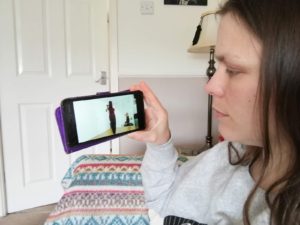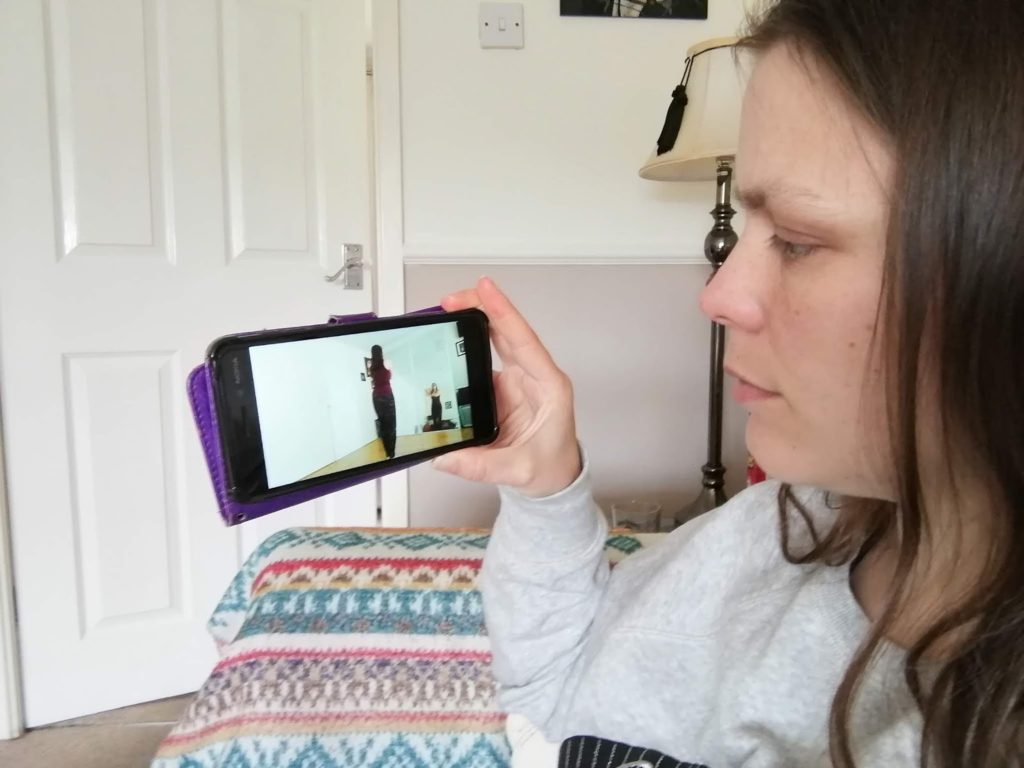How much of your self-worth do you place in your dancing? Can you separate who you are from the person you see in the mirror at dance class? Or on the video screen when you get a performance video? Can you even bear to record yourself when practicing or improvising? Last year I listened to a podcast called ‘10,000 No’s with Matthew Del Negro’. Matthew is an actor and describes his career as being told ‘No’ for a living. The podcast is about people’s experiences of brushing themselves off and getting back up after failure or being told ‘No’. I only listened to the podcast because Eric Christian Olsen, an actor I have a huge crush on, was a guest. I listened to his episode and had several lightbulb moments – so much of what he said struck a nerve. He intelligently described how problematic it is to tie up your self-worth in your job, or indeed in a label such as ‘actor’ or in my case ‘dancer’. He discussed being in movies that were critically panned and that if you look at his IMDb listing it is a list of 95% failures, not to mention the amount of failed auditions he must have been through as an actor. He also discussed how failure is an opportunity for learning and the experience of and how you respond to the failure is more important than the failure itself.
Last year I listened to a podcast called ‘10,000 No’s with Matthew Del Negro’. Matthew is an actor and describes his career as being told ‘No’ for a living. The podcast is about people’s experiences of brushing themselves off and getting back up after failure or being told ‘No’. I only listened to the podcast because Eric Christian Olsen, an actor I have a huge crush on, was a guest. I listened to his episode and had several lightbulb moments – so much of what he said struck a nerve. He intelligently described how problematic it is to tie up your self-worth in your job, or indeed in a label such as ‘actor’ or in my case ‘dancer’. He discussed being in movies that were critically panned and that if you look at his IMDb listing it is a list of 95% failures, not to mention the amount of failed auditions he must have been through as an actor. He also discussed how failure is an opportunity for learning and the experience of and how you respond to the failure is more important than the failure itself.
In anything creative you’re kind of setting yourself up for failure. In learning in general you will face moments of failure – where you haven’t quite nailed something yet, where gaps in your knowledge preclude you from achieving something. Where someone is just better than you are right now. It’s how you respond to those perceived ‘failures’ that counts. Putting all of your self-worth into something that is supposed to be fun and enjoyable like dance or exercise or any other creative/physical pursuit you enjoy, is asking for trouble.
The biggest thing I hear from students is that they can’t bear to look at themselves on video. That they criticise themselves relentlessly, that looking at a video is like torture and that the whole experience sends them on a downward spiral of self-hatred. It astonishes me how many dancers have low self-esteem. But it shouldn’t because I’ve been there too. I have been the dancer that talks down to themselves in the studio, that criticises their performance not from a more objective standpoint of what worked and what didn’t, but of how I looked, the things that I failed at, how sloppy my arms looked, how ugly I felt. I’ve done that, and I know that all it does is destroy you, not only in your dance life but in your overall self-worth.
Videoing your practice is a fantastic way of improving – you can see things that are going wrong and need fixing of course, but you can also see what’s strong and the things that are successful. You can track improvements over time and get a visual rewarding record of your progress. Videoing improvisations can help with creating choreography (and of course remembering what you’ve made!). I used to hate watching back videos but I have learned to separate my self-worth from what I see on screen.
How have I done that? I choose to see everything I do as research. Sometimes things look (in my eyes) amazing and that’s when I usually share a video on my Instagram! Most of the time I don’t think it looks amazing, but nothing recorded is wasted no matter how it looks. It’s an exercise in identifying things that work and why, and things that don’t work and why. Things get worked and reworked and being able to look at myself on video means things move so much more quickly than they used to. I used to imagine that I was watching someone else and do the self-talk as if I was talking to a friend or colleague or student. Now I am able to just look at my image as a body moving in the space, and what I like aesthetically on that body, what has potential to work with repetition, what’s worth further exploration and what I want to bin off. None of this is a waste of time – it’s all research towards my artistic outcome and development of my personal style. It’s also worth remembering that not everyone is going to like your work and that their opinion of that is in no way a reflection of who you are as a person or indeed what they think of you. There are several dancers whom I admire the hard work of, but whose style does not resonate with me at all. That doesn’t mean I don’t like them as people and I’d hope that they wouldn’t think that. At the end of the day, it’s my aesthetic –I can still admire their work even if it’s not my taste.
I think it’s important to remember that the label ‘dancer’ is a loaded term – filled with expectation about how hard you should be working, how much work you should be producing and the quality of the work you put out. Over the years I’ve had a varying relationship with the label. These days, while I still tell people that I’m a dancer when they ask what I do for a living, I prefer to tell myself that ‘I dance’. This way I can separate myself from the dancing in a way that’s healthy. I like to play music but I don’t define myself as a musician. I like to paint but I’m not an artist. I like to write but I’m not an author. The more specifically you define yourself, the more harshly you can allow yourself judge what you’ve achieved, even minimise it. And you can put a whole load of unneeded pressure on yourself – for something that’s supposed to be your fun hobby! Unburden your shoulders of what a label suggests – enjoy dancing, know that it is only one facet of what makes you you, and try to let go of the negative emotions that can emerge when you begin to judge your hobby as if it were the only thing that defines you. You can of course take dance seriously (as I do as a dance teacher and guider of others who dance), but you should also keep a playful curiosity. Remember – everything you do is research – even the ‘failures’ – and are not a reflection of who you are as a person. Taking this approach has led me to a much more healthy relationship with my work.I hope it helps you find a healthier relationship with dance too.
Here’s a link to the podcast with Matthew Del Negro & Eric Christian Olsen: https://tenthousandnos.libsyn.com/ep-26-actor-eric-christian-olsen-choosing-hope-over-fear

